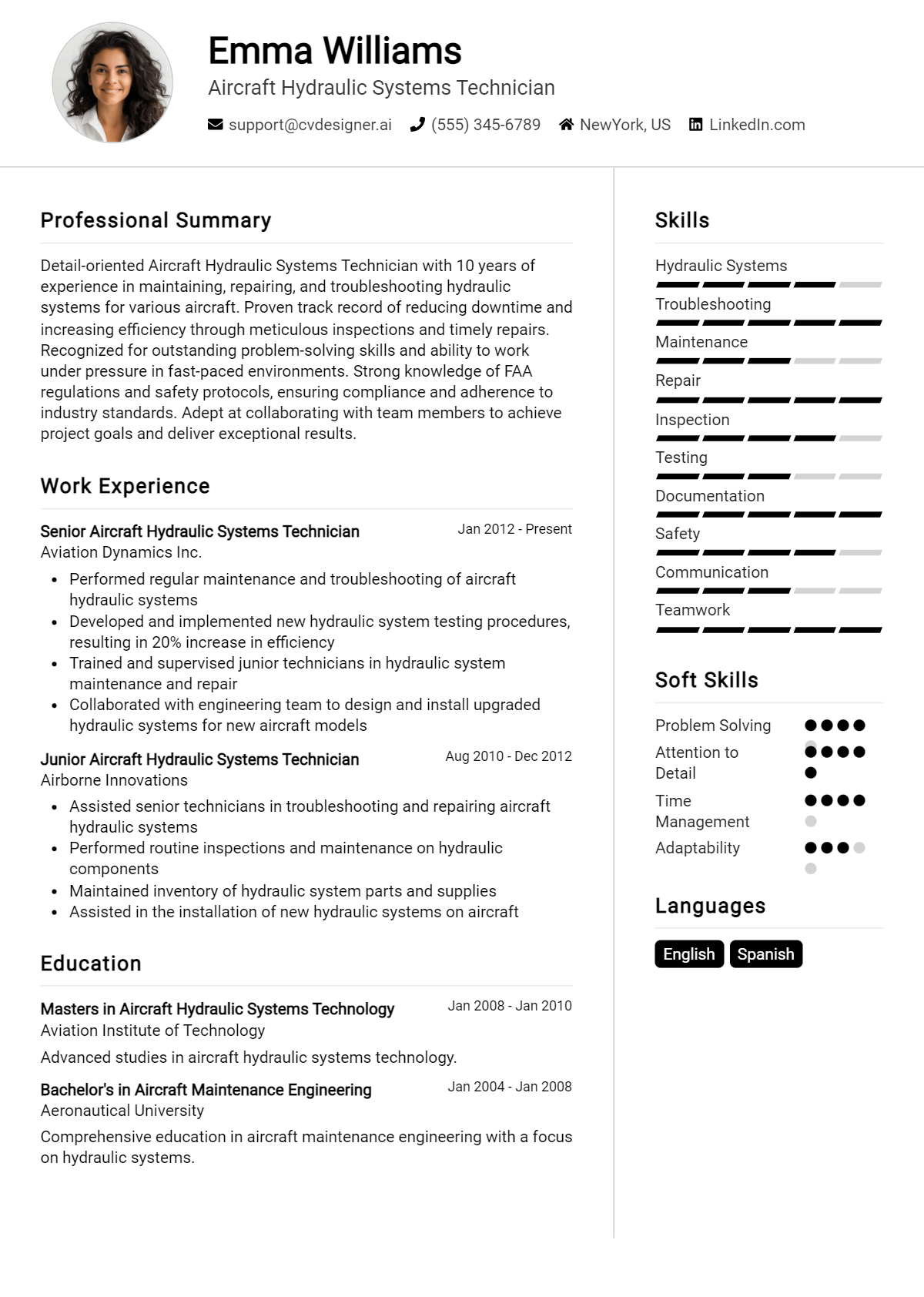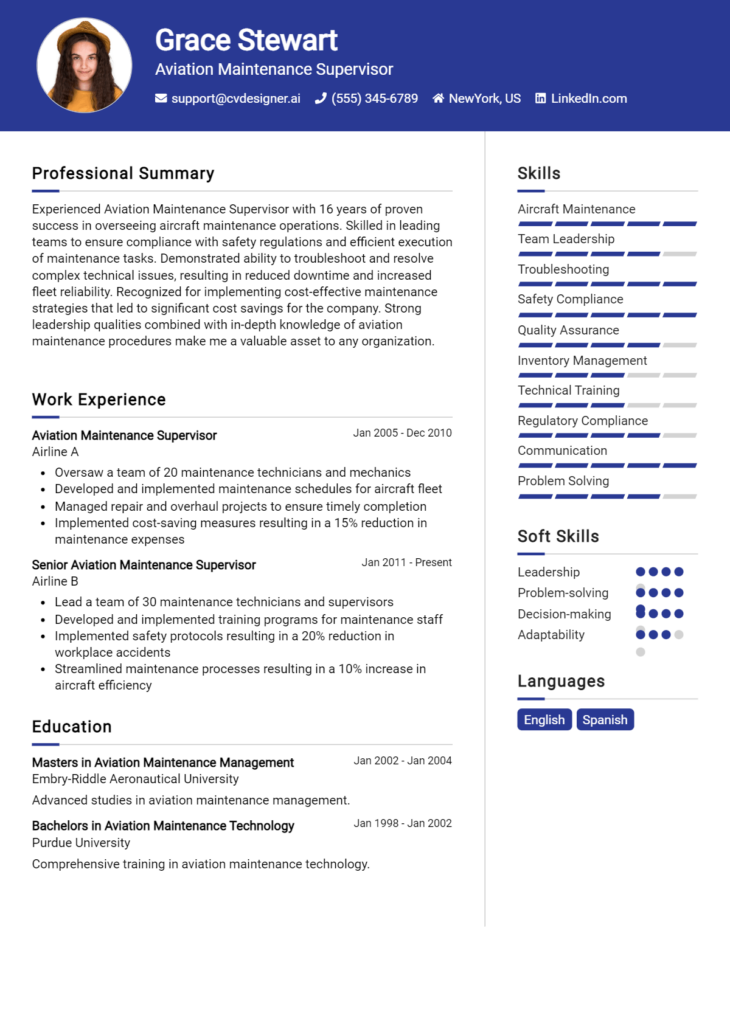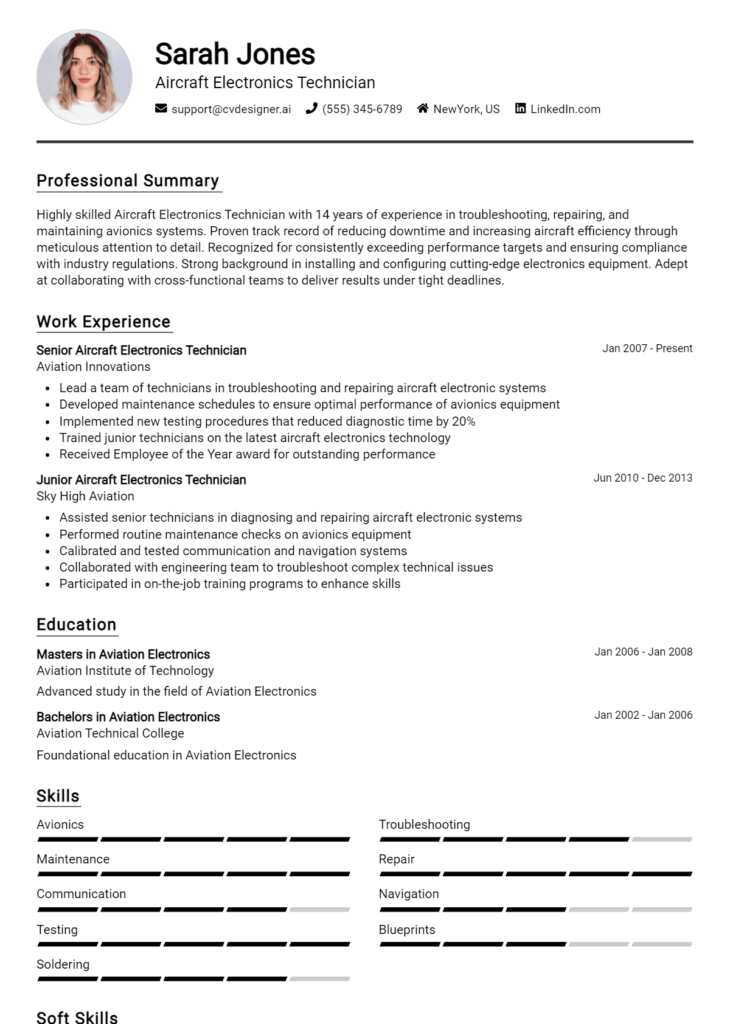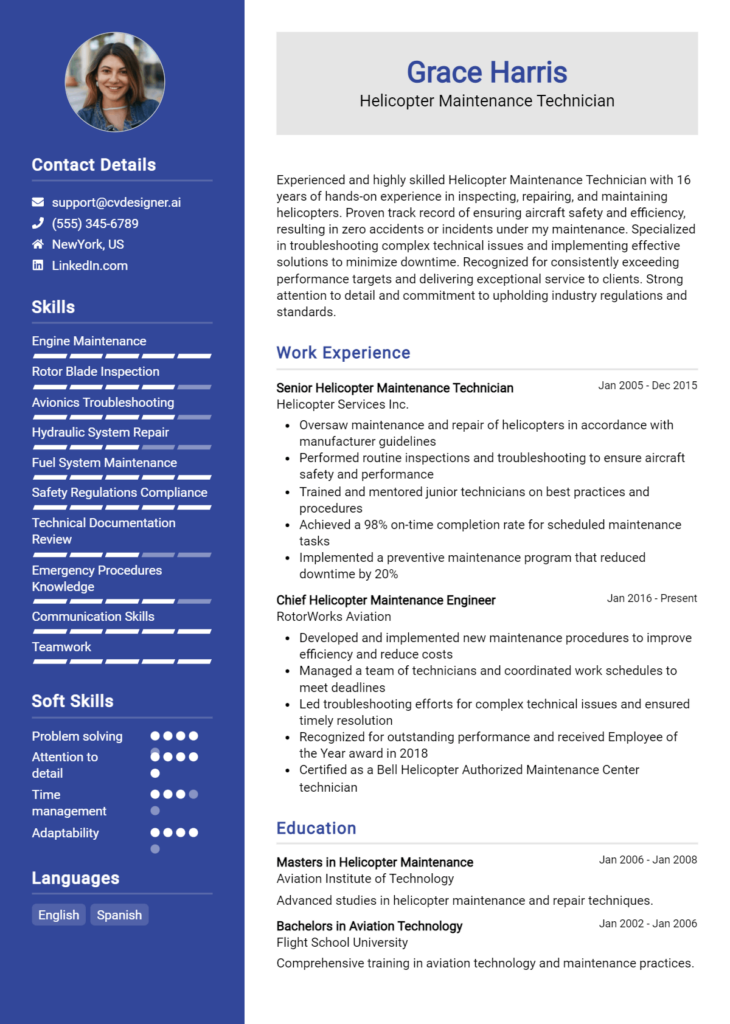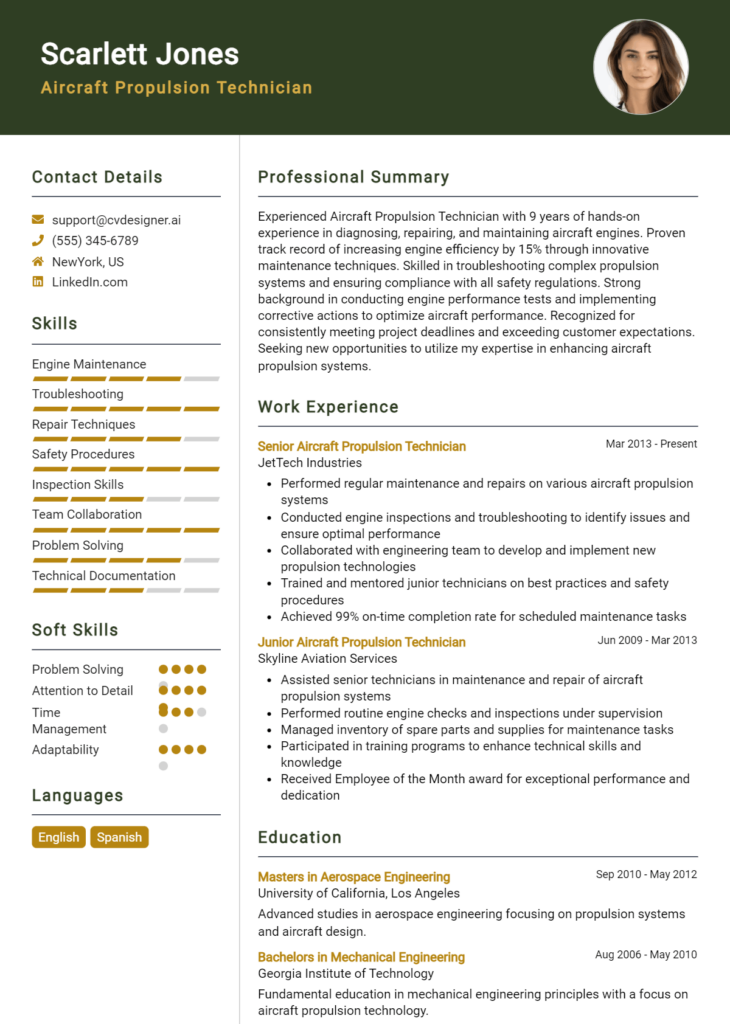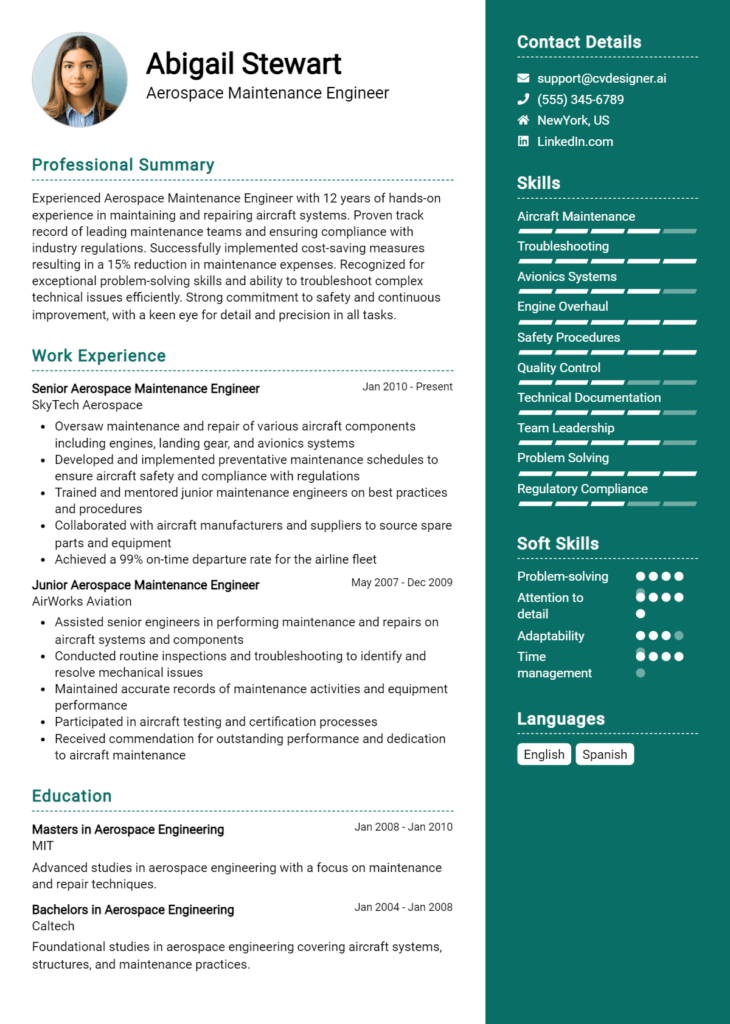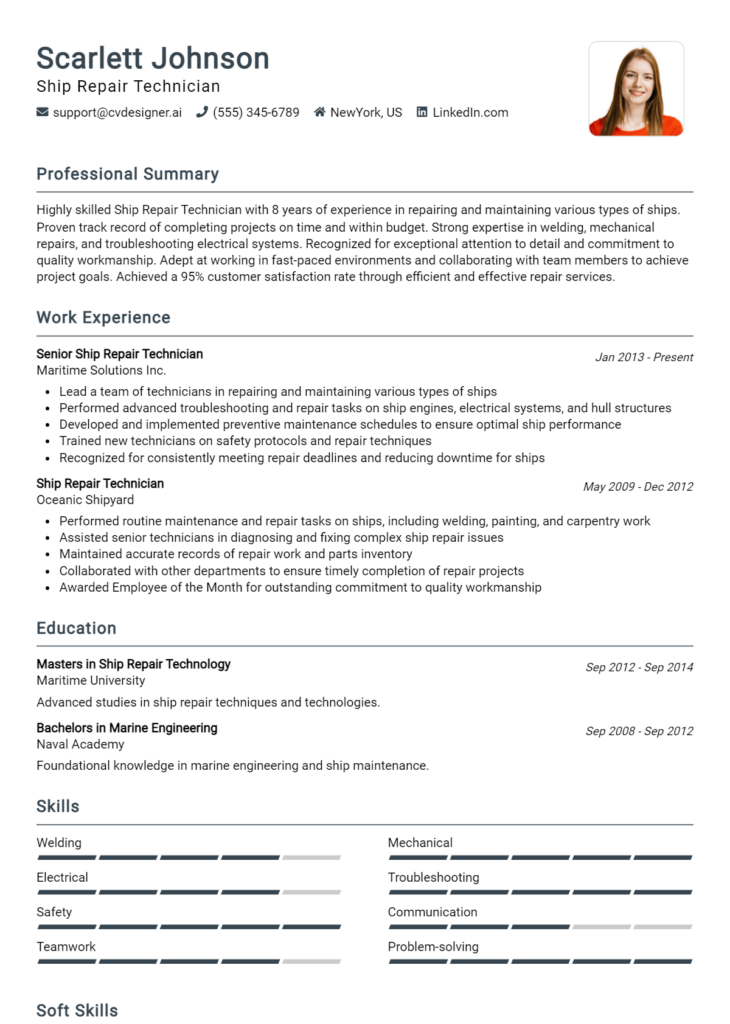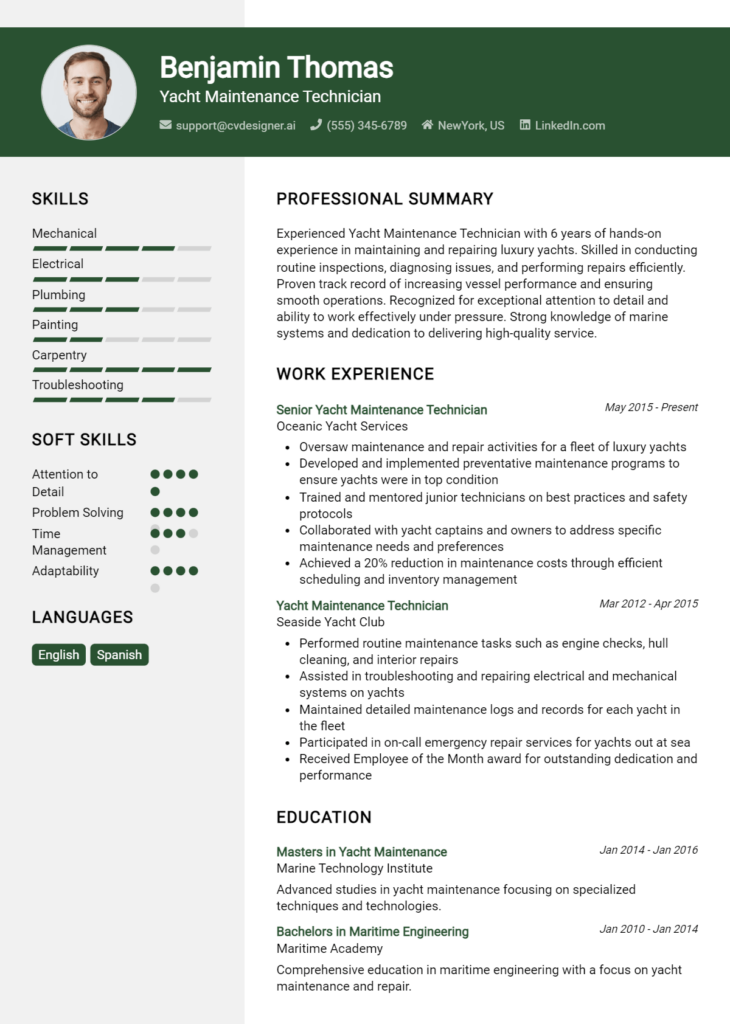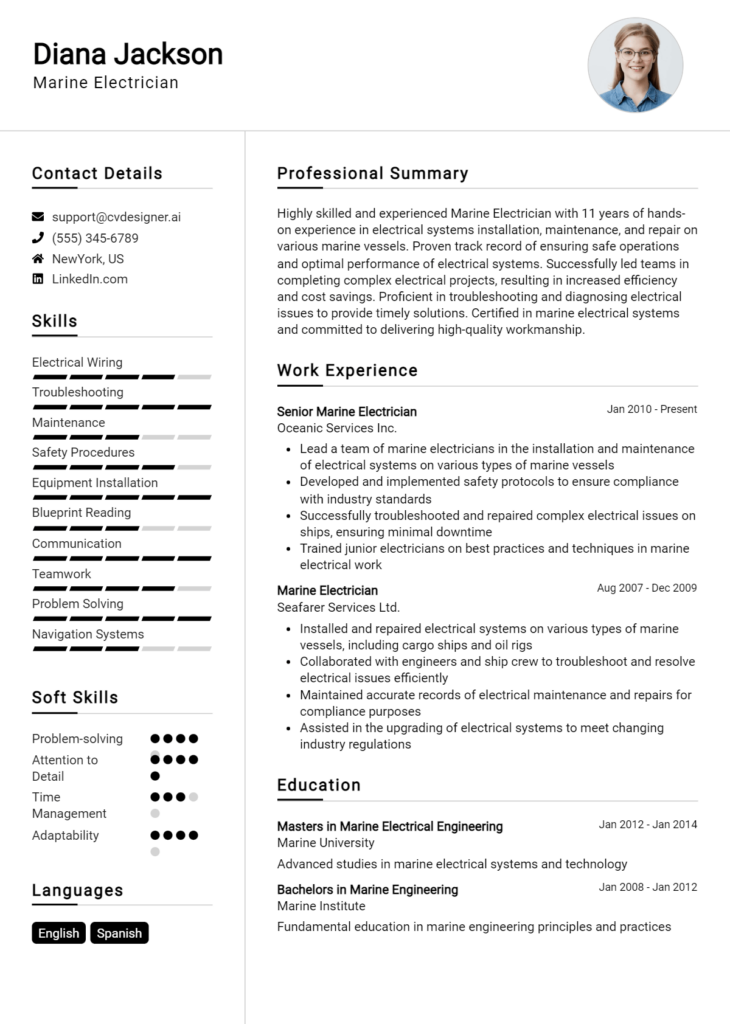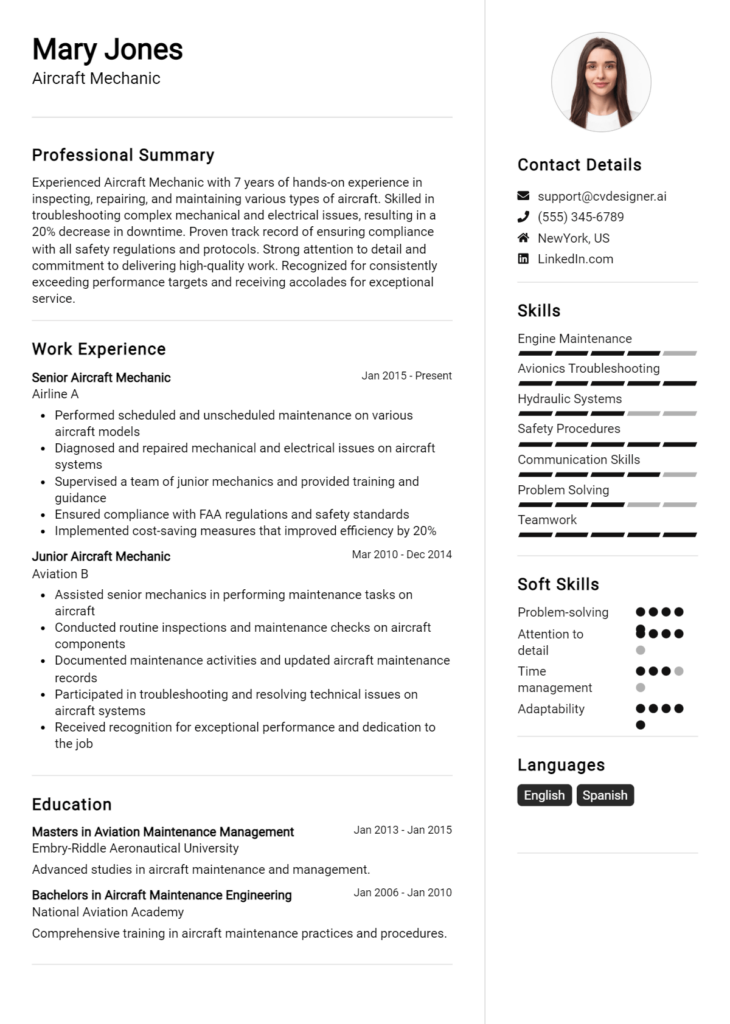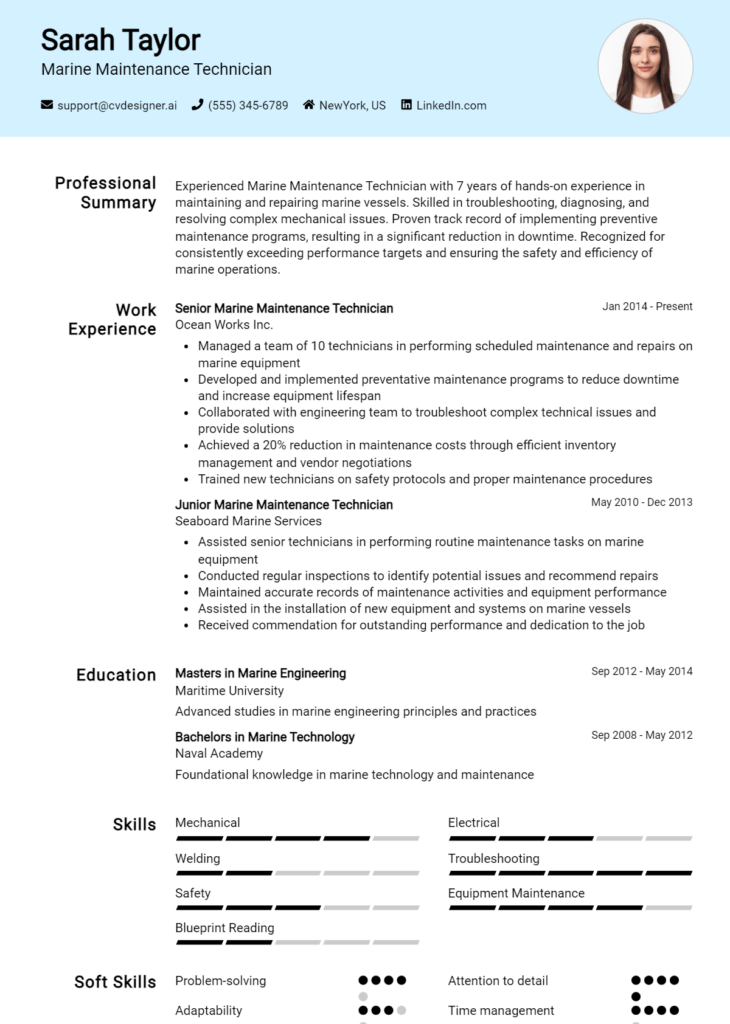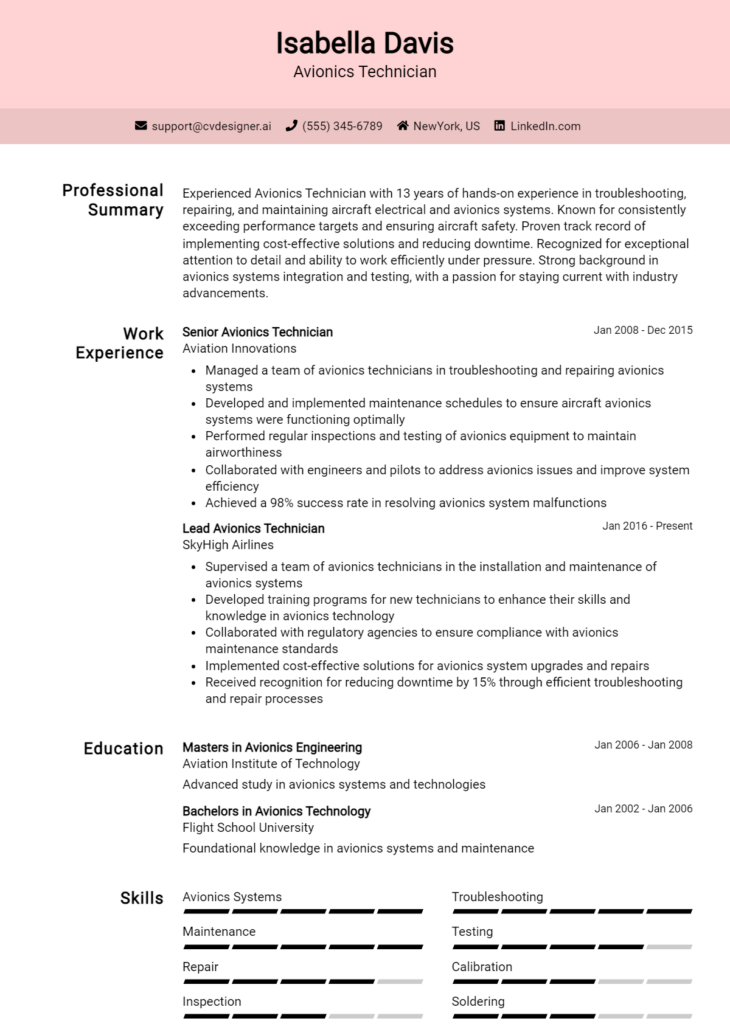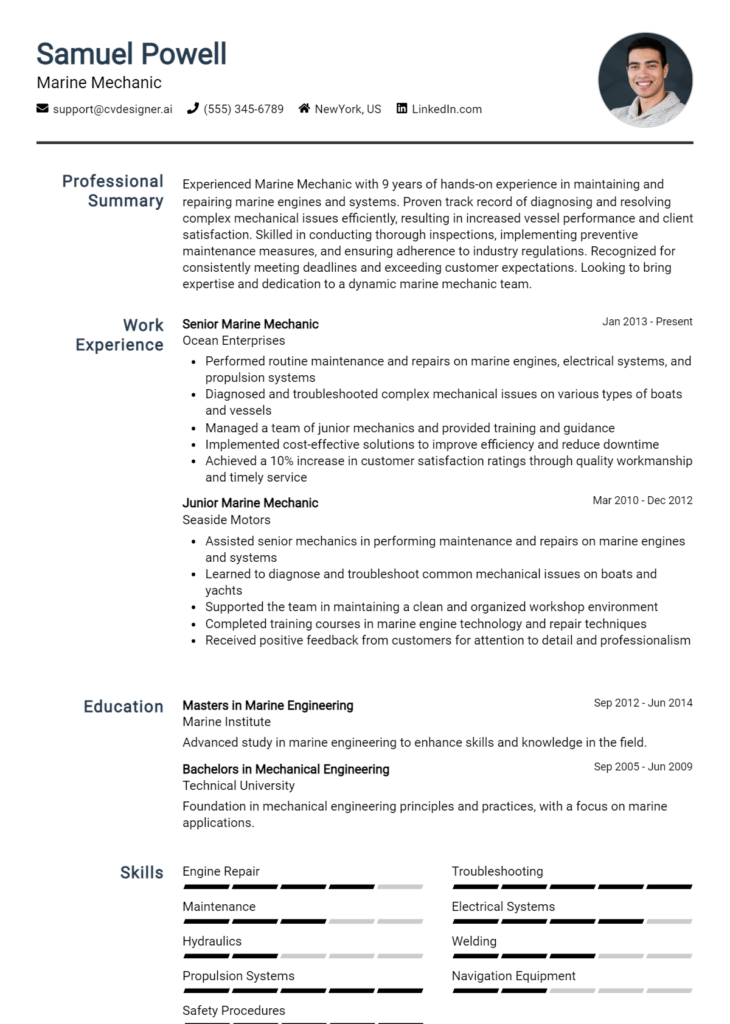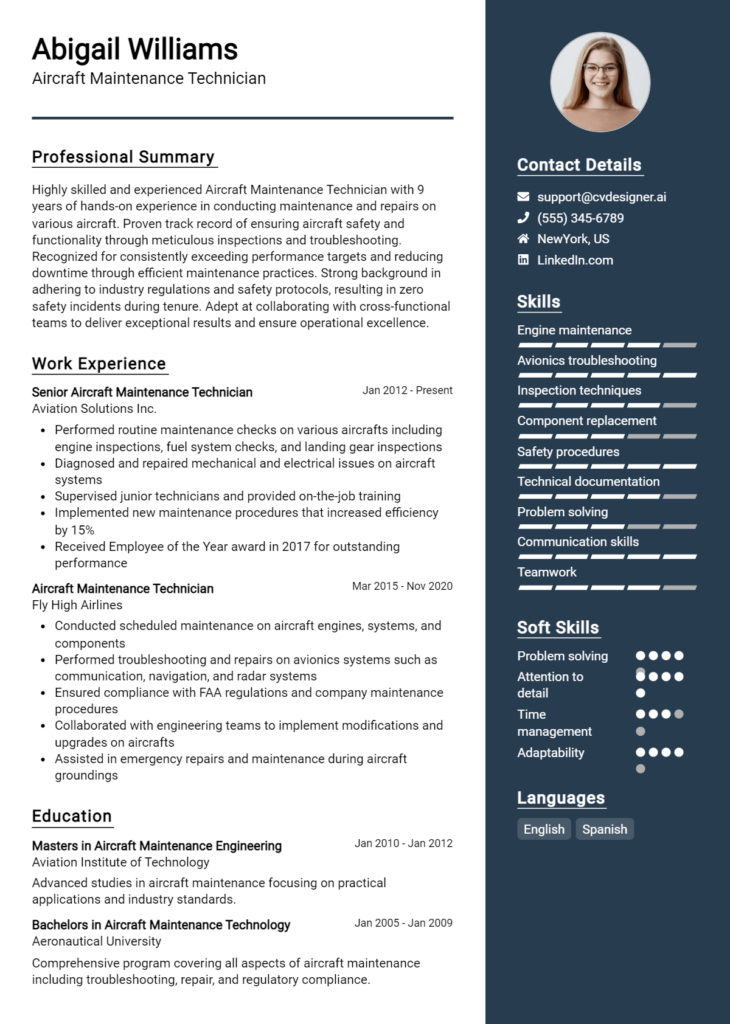Aircraft Hydraulic Systems Technician Core Responsibilities
As an Aircraft Hydraulic Systems Technician, professionals are responsible for maintaining, troubleshooting, and repairing hydraulic systems within various aircraft. This role requires a strong understanding of hydraulic principles, attention to detail, and effective problem-solving skills, as technicians often collaborate with engineers and flight crews to ensure operational efficiency. A well-structured resume highlighting these technical and operational abilities can significantly enhance job prospects, showcasing the candidate's commitment to the organization’s safety and performance goals.
Common Responsibilities Listed on Aircraft Hydraulic Systems Technician Resume
- Inspect and test hydraulic systems for functionality and safety.
- Diagnose and resolve hydraulic system malfunctions.
- Perform routine maintenance and repairs on hydraulic components.
- Maintain detailed records of maintenance and repairs performed.
- Collaborate with engineering teams to implement system improvements.
- Ensure compliance with safety regulations and industry standards.
- Calibrate hydraulic systems and components as needed.
- Train and mentor junior technicians on hydraulic systems.
- Utilize diagnostic tools and equipment effectively.
- Provide technical support during aircraft inspections and audits.
- Stay updated on advancements in hydraulic technology.
High-Level Resume Tips for Aircraft Hydraulic Systems Technician Professionals
In the competitive field of Aircraft Hydraulic Systems Technicians, a well-crafted resume is not just a formality; it is often the first impression you make on potential employers. Your resume serves as a reflection of your skills, achievements, and professional journey, making it essential to present a compelling narrative of your qualifications. A tailored resume can showcase your specific expertise in hydraulic systems, troubleshooting, and maintenance, highlighting how you can add value to an organization. This guide aims to provide practical and actionable resume tips specifically designed for Aircraft Hydraulic Systems Technician professionals, ensuring that your resume stands out in a crowded job market.
Top Resume Tips for Aircraft Hydraulic Systems Technician Professionals
- Tailor your resume to the job description by incorporating relevant keywords and phrases from the job listing.
- Highlight your relevant experience with specific examples of hydraulic systems you’ve worked on, including the types of aircraft.
- Quantify your achievements; for instance, mention any reductions in downtime or improvements in system efficiency you achieved.
- Include industry-specific skills such as system troubleshooting, fluid dynamics knowledge, and proficiency in hydraulic system repairs.
- Utilize a clear and professional format, ensuring that your resume is easy to read and logically organized.
- List any certifications or training relevant to hydraulic systems, such as FAA certifications or specialized courses.
- Showcase any experience with specific hydraulic tools and technologies that are commonly used in the industry.
- Incorporate soft skills that are critical for the role, such as problem-solving, attention to detail, and teamwork.
- Keep your resume concise, ideally one page, while ensuring that all relevant information is effectively communicated.
- Proofread your resume meticulously to avoid any errors that could undermine your professionalism.
By implementing these tips, you can significantly increase your chances of landing a job in the Aircraft Hydraulic Systems Technician field. A well-structured and tailored resume not only highlights your qualifications but also demonstrates your commitment to professionalism, making you a more attractive candidate to potential employers.
Why Resume Headlines & Titles are Important for Aircraft Hydraulic Systems Technician
The role of an Aircraft Hydraulic Systems Technician is critical in ensuring the safety and efficiency of aircraft operations. Given the competitive nature of the aviation industry, a well-crafted resume is essential for standing out among numerous applicants. Resume headlines and titles serve as the first impression a hiring manager has of a candidate, encapsulating their key qualifications and professional identity in a succinct phrase. A strong headline can immediately grab attention, highlighting relevant experience and skills that align with the job description, while also setting the tone for the rest of the resume. It should be concise, relevant, and directly related to the specific role being applied for, making it a crucial element of a successful job application.
Best Practices for Crafting Resume Headlines for Aircraft Hydraulic Systems Technician
- Be concise: Aim for a headline that is brief yet informative, ideally one sentence or phrase.
- Use industry-specific terminology: Incorporate language and keywords relevant to hydraulic systems and aviation.
- Highlight key qualifications: Focus on your most relevant skills, certifications, or experiences that directly pertain to the role.
- Customize for each application: Tailor your headline to match the specific job description and requirements of the position.
- Showcase accomplishments: If applicable, include quantifiable achievements that demonstrate your expertise.
- Avoid vague language: Use specific terms that clearly convey your role and capabilities within the field.
- Maintain professionalism: Ensure your headline reflects a serious and professional tone suitable for the aviation industry.
- Include your certification or specialization: If you have particular qualifications, consider including them in your headline for added impact.
Example Resume Headlines for Aircraft Hydraulic Systems Technician
Strong Resume Headlines
Certified Aircraft Hydraulic Systems Technician with 5+ years of proven experience in troubleshooting and repairs.
Experienced Hydraulic Systems Specialist Skilled in Preventive Maintenance and System Diagnostics.
Results-Driven Aircraft Hydraulic Systems Technician Committed to Safety and Efficiency in Aerospace Maintenance.
Expert in Hydraulic Component Repair and System Overhaul with a Proven Track Record of Reducing Downtime.
Weak Resume Headlines
Technician Looking for a Job.
Experienced Worker in Aviation.
Hydraulic Systems Experience.
The strong headlines are effective because they are specific, highlight relevant skills and accomplishments, and convey a strong professional identity that aligns with the job requirements. They grab the attention of hiring managers by demonstrating the candidate's qualifications in a compelling manner. In contrast, the weak headlines fail to impress due to their vagueness and lack of detail, which do not clearly communicate the candidate's strengths or suitability for the role. A headline that lacks specificity can easily be overlooked in a sea of applications, making it essential to present a focused and impactful introduction.
Writing an Exceptional Aircraft Hydraulic Systems Technician Resume Summary
Crafting an exceptional resume summary is a crucial step for an Aircraft Hydraulic Systems Technician, as it serves as the candidate's first opportunity to make a strong impression on hiring managers. A well-written summary quickly captures attention by succinctly highlighting key skills, relevant experience, and notable accomplishments related to the role. Given the competitive nature of the aviation industry, this concise and impactful statement must be tailored to the specific job being applied for, effectively setting the tone for the rest of the resume and demonstrating the candidate's suitability for the position.
Best Practices for Writing a Aircraft Hydraulic Systems Technician Resume Summary
- Quantify Achievements: Use numbers and metrics to demonstrate the impact of your work.
- Focus on Relevant Skills: Highlight specific technical skills and competencies related to hydraulic systems.
- Tailor to the Job Description: Customize your summary to align with the requirements and responsibilities outlined in the job posting.
- Keep it Concise: Aim for 3-5 sentences that succinctly capture your professional identity and value.
- Use Action Words: Begin sentences with strong verbs to convey confidence and proactivity.
- Showcase Certifications: Mention any relevant certifications or training that enhance your qualifications.
- Highlight Problem-Solving Capabilities: Emphasize your ability to troubleshoot and resolve hydraulic system issues effectively.
- Include Industry Knowledge: Reference your understanding of industry standards and practices to demonstrate your expertise.
Example Aircraft Hydraulic Systems Technician Resume Summaries
Strong Resume Summaries
Dedicated Aircraft Hydraulic Systems Technician with over 8 years of experience in maintaining and repairing hydraulic systems on commercial aircraft. Achieved a 95% success rate in troubleshooting system failures, resulting in a 20% decrease in aircraft downtime.
Results-oriented technician with extensive knowledge in hydraulic systems and a proven track record of reducing maintenance costs by 15% through effective process improvements and timely repairs. Certified in Aircraft Hydraulic Systems Maintenance.
Skilled in diagnosing and repairing hydraulic system malfunctions, with expertise in both military and civilian aircraft. Successfully led a team project that upgraded hydraulic components, enhancing system efficiency by 30%.
Weak Resume Summaries
Experienced technician looking for a position in aviation. I have worked with hydraulic systems before.
Hardworking professional with skills in aircraft maintenance. Interested in hydraulic systems.
The examples provided illustrate the stark contrast between strong and weak resume summaries. Strong summaries effectively quantify achievements, specify relevant skills, and directly relate to the Aircraft Hydraulic Systems Technician role, making them compelling and memorable. In contrast, weak summaries are vague and lack measurable outcomes or specific experiences, failing to capture the attention of hiring managers or convey the candidate's qualifications effectively.
Work Experience Section for Aircraft Hydraulic Systems Technician Resume
The work experience section is a critical component of an Aircraft Hydraulic Systems Technician resume, as it serves to demonstrate the candidate's technical skills, leadership capabilities, and commitment to delivering high-quality results in the aviation industry. This section allows candidates to highlight their relevant experiences, showcasing their ability to manage teams effectively and contribute to successful projects. Quantifying achievements, such as reductions in downtime or improvements in system efficiency, is crucial in making a strong impression on potential employers. Moreover, aligning the experience with industry standards will ensure that the candidate stands out in a competitive job market.
Best Practices for Aircraft Hydraulic Systems Technician Work Experience
- Emphasize technical skills relevant to hydraulic systems, such as troubleshooting, repair, and maintenance.
- Quantify achievements by including metrics, such as percentage improvements in system performance or reduced repair times.
- Highlight teamwork and collaboration by detailing experiences in leading or participating in team projects.
- Use specific examples to illustrate problem-solving capabilities in high-pressure situations.
- Align your experience with industry standards and regulations, showcasing familiarity with relevant guidelines.
- Focus on continuous learning and professional development, mentioning certifications or specialized training.
- Tailor your work experience to match the specific job description and requirements of the position you are applying for.
- Include a variety of experiences, from hands-on technical work to supervisory roles, to showcase versatility.
Example Work Experiences for Aircraft Hydraulic Systems Technician
Strong Experiences
- Led a team of 5 technicians in a project that reduced hydraulic system failure rates by 30% through improved maintenance protocols.
- Implemented a new hydraulic testing procedure that decreased testing time by 25%, significantly improving workflow efficiency.
- Trained and mentored junior technicians, resulting in a 40% increase in their technical proficiency within six months.
- Collaborated with engineering teams to redesign hydraulic system components, which enhanced system performance by 15% in flight tests.
Weak Experiences
- Assisted with hydraulic system repairs when needed.
- Worked on hydraulic systems in an aviation setting.
- Helped maintain equipment and tools for the team.
- Participated in team meetings regarding hydraulic systems.
The examples listed as strong experiences are considered effective because they provide specific, quantifiable outcomes that demonstrate the candidate's impact on hydraulic system performance, team leadership, and collaboration with other departments. In contrast, the weak experiences lack detail and measurable results, making them less compelling to potential employers. Focusing on achievements and demonstrating a clear understanding of the technical and collaborative aspects of the role can significantly enhance the effectiveness of the work experience section in a resume.
Education and Certifications Section for Aircraft Hydraulic Systems Technician Resume
The education and certifications section of an Aircraft Hydraulic Systems Technician resume is crucial for showcasing a candidate's academic foundation and their commitment to professional development in a highly specialized field. This section not only highlights relevant degrees and industry-recognized certifications but also demonstrates ongoing learning efforts that align with the demands of the role. By providing information on relevant coursework, specialized training, and certifications, candidates can significantly enhance their credibility and illustrate their preparedness for the responsibilities of an Aircraft Hydraulic Systems Technician.
Best Practices for Aircraft Hydraulic Systems Technician Education and Certifications
- Include only relevant degrees and certifications that apply directly to aircraft hydraulic systems technology.
- List certifications in order of relevance, prioritizing those that are industry-recognized or specialized.
- Provide specifics about coursework that pertains to hydraulic systems, fluid dynamics, and related technical subjects.
- Highlight continuous education efforts, such as workshops, seminars, or online courses that enhance skills.
- Use clear and concise formatting to make the section easy to read and visually appealing.
- Be honest about qualifications—do not include any certifications that are expired or irrelevant.
- Consider adding industry associations or memberships that further validate expertise in hydraulic systems.
- Tailor the section to reflect the specific requirements mentioned in the job description.
Example Education and Certifications for Aircraft Hydraulic Systems Technician
Strong Examples
- Associate Degree in Aircraft Maintenance Technology from ABC Technical College, GPA: 3.8
- Hydraulic Systems Certification from the National Center for Aerospace and Transportation Technologies (NCATT)
- Completed coursework in Fluid Power Systems, Aircraft Hydraulics, and Pneumatics.
- FAA Airframe and Powerplant (A&P) License, with a focus on hydraulic systems maintenance.
Weak Examples
- Bachelor’s Degree in Business Administration from XYZ University.
- Certification in Computer Repair (not relevant to aircraft hydraulic systems).
- High School Diploma with no additional technical training.
- Outdated certification in Basic Automotive Repair, expired in 2015.
The strong examples are considered effective because they are directly relevant to the Aircraft Hydraulic Systems Technician role, showcasing specialized education and certifications that enhance the candidate's qualifications. In contrast, the weak examples highlight educational backgrounds and certifications that do not relate to the requirements of the position, ultimately detracting from the candidate's credibility and suitability for the role.
Top Skills & Keywords for Aircraft Hydraulic Systems Technician Resume
As an Aircraft Hydraulic Systems Technician, showcasing the right skills on your resume is crucial for standing out in a competitive job market. Employers seek candidates who not only possess technical knowledge but also demonstrate strong problem-solving abilities, effective communication, and teamwork. Highlighting both hard and soft skills will not only reflect your technical proficiency but also your aptitude for collaboration and adaptability within a dynamic work environment. A well-rounded skill set can significantly enhance your chances of landing an interview and ultimately securing a position in this specialized field.
Top Hard & Soft Skills for Aircraft Hydraulic Systems Technician
Soft Skills
- Attention to detail
- Problem-solving skills
- Effective communication
- Team collaboration
- Time management
- Adaptability
- Critical thinking
- Customer service orientation
- Troubleshooting abilities
- Safety awareness
Hard Skills
- Proficient in hydraulic system maintenance and repair
- Knowledge of aircraft hydraulic schematics
- Experience with hydraulic fluid analysis
- Familiarity with hydraulic control systems
- Proficient in using diagnostic tools and equipment
- Understanding of pressure testing techniques
- Ability to interpret technical manuals and blueprints
- Experience with welding and fabrication
- Proficiency in record-keeping and documentation
- Knowledge of regulatory compliance and safety standards
By emphasizing these skills in your resume, along with relevant work experience, you can effectively convey your qualifications and readiness for the role of Aircraft Hydraulic Systems Technician.
Stand Out with a Winning Aircraft Hydraulic Systems Technician Cover Letter
Dear [Hiring Manager's Name],
I am writing to express my strong interest in the Aircraft Hydraulic Systems Technician position at [Company Name] as advertised on [Where You Found the Job Posting]. With a solid background in hydraulic systems maintenance and a passion for aviation, I am excited about the opportunity to contribute my skills and expertise to your team. My experience in diagnosing, repairing, and overhauling hydraulic systems aligns perfectly with the requirements of this role, and I am eager to bring my technical proficiency and problem-solving abilities to [Company Name].
Throughout my career, I have gained extensive experience in aircraft hydraulic systems, including the maintenance and repair of landing gear, flight control systems, and utility systems. At [Previous Employer], I successfully led a project to overhaul hydraulic actuators, improving system efficiency by 15% and reducing downtime. My hands-on experience with troubleshooting hydraulic circuits and components, coupled with my attention to detail, ensures that I consistently deliver high-quality work while adhering to safety protocols and regulations.
In addition to my technical skills, I pride myself on my ability to work collaboratively within a team environment. I understand the importance of clear communication and teamwork in ensuring the safety and efficiency of aircraft operations. I am committed to continuous learning and staying up-to-date with industry advancements, which allows me to bring innovative solutions to the challenges faced in hydraulic systems maintenance. I am excited about the opportunity to contribute to [Company Name] and am confident that my background and skills will make me a valuable asset to your team.
Thank you for considering my application. I look forward to the possibility of discussing how my experience and passion for aircraft hydraulic systems can contribute to the success of [Company Name]. I am eager to bring my dedication and expertise to your organization and help ensure the highest standards of performance and safety in your fleet.
Sincerely,
[Your Name]
[Your Phone Number]
[Your Email Address]
[Your LinkedIn Profile]
Common Mistakes to Avoid in a Aircraft Hydraulic Systems Technician Resume
When applying for a position as an Aircraft Hydraulic Systems Technician, it's crucial to craft a resume that effectively showcases your skills and experiences. However, many candidates make common mistakes that can hinder their chances of landing an interview. Avoiding these pitfalls can significantly enhance your resume's impact and better highlight your qualifications for this specialized role.
Neglecting Specific Skills: Failing to detail specific hydraulic systems knowledge and technical skills can make your resume less appealing. Ensure you mention systems like landing gear, brakes, and flight control systems.
Using Generic Job Descriptions: Relying on generic descriptions for past roles can diminish your unique qualifications. Tailor your job descriptions to reflect the specific duties and responsibilities relevant to hydraulic systems.
Ignoring Certifications and Training: Not highlighting relevant certifications such as FAA Airframe and Powerplant (A&P) or specific hydraulic systems training can weaken your resume. Certifications demonstrate your commitment to professional development.
Overloading with Technical Jargon: While technical language is important, overloading your resume with jargon can confuse hiring managers. Aim for clarity and balance technical terms with easily understandable language.
Failing to Quantify Achievements: Not providing quantifiable results from your previous roles can lead to missed opportunities. Whenever possible, include metrics that showcase your contributions, such as reduced downtime or improved system efficiency.
Inconsistent Formatting: A resume that lacks consistency in formatting can appear unprofessional. Use a clean, uniform format for headings, bullet points, and font styles to enhance readability.
Omitting Relevant Experience: Excluding internships, volunteer work, or part-time positions related to hydraulic systems can limit your perceived expertise. Include all relevant experiences, even if they are not full-time roles.
Neglecting to Proofread: Spelling and grammatical errors can create a negative impression. Carefully proofread your resume to ensure it is free from mistakes and presents you as detail-oriented.
Conclusion
As an Aircraft Hydraulic Systems Technician, you play a crucial role in ensuring the safety and efficiency of aircraft operations. Your expertise in diagnosing, repairing, and maintaining hydraulic systems is essential for the overall performance of aviation machinery. Throughout this article, we have covered the necessary skills, qualifications, and responsibilities associated with this vital position, including technical knowledge, problem-solving abilities, and adherence to safety protocols.
In summary, your resume should effectively showcase your technical skills, relevant experience, and certifications that demonstrate your capability in this field. Tailoring your resume to highlight your achievements and contributions will make you stand out to potential employers.
Now is the perfect time to review your Aircraft Hydraulic Systems Technician resume and ensure it reflects your qualifications accurately. To assist you in this process, consider utilizing the following resources:
- Explore our resume templates to find a design that suits your style.
- Use the resume builder to create a professional and polished document easily.
- Check out resume examples for inspiration and ideas on how to present your experience.
- Don’t forget to craft a compelling cover letter using our cover letter templates to enhance your job application.
By taking these steps, you'll be better prepared to showcase your qualifications and secure your next opportunity in the aviation industry.

